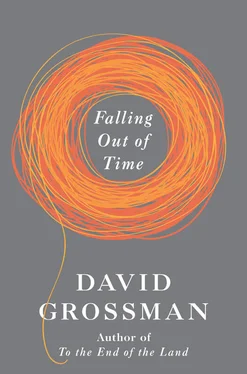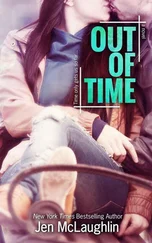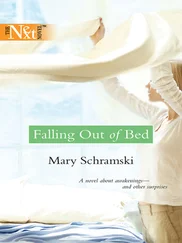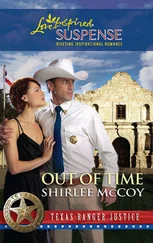ELDERLY MATH TEACHER: My heart tells me, my boy, that from the moment a person notices the blaze, he is destined to get up and go to it.
TOWN CHRONICLER: As he spoke, his large feet shuddered and shook the wooden bench. My own small feet were suddenly filled with motion. I talked to him silently. I said there was a time in the world when my daughter was not in it at all. She was not yet. Nor was there the happiness she brought me, nor all these torments. I wanted him to look at me with his lost, confused gaze in which everything was possible. I wanted him to call me to a house wall again and test me on addition-subtraction for all eternity. I thought: Perhaps he also longs to be an innocent young teacher again? Perhaps I could ask my wife here, and together we could build a little class that would suffer no sorrow? I had already begun to hum “two and two are four” when he suddenly leaped off the bench — I was amazed to see how agile he still was — and stood looking at his twitching feet. Then he spread his hands before me in apology and turned to leave, mumbling to himself:
ELDERLY MATH TEACHER:
Here I will fall,
now will I fall?
I do not fall.
Here is shadow
and fog,
frost
rises
from a darkened pit—
now,
now
I will fall—
TOWN CHRONICLER’S WIFE:
Now, here,
the heart
will stop—
it does not stop—
here is shadow
and fog—
now?
Now will I fall?
TOWN CHRONICLER: And she walked! Walked away! Suddenly, out of the darkness, she appeared beside me on the street, then walked away without seeing me at all, moving behind the teacher as if sleepwalking. I quickly lay down on the bench and made myself as small as possible. I was very cold. I tried to fall asleep. I could not. I do not know what I shall do with myself today, and the sun has not even risen. The town is terrifyingly empty. I wander the streets. No one. I run to the wharf, dig through reeking piles of nets and dry seaweed — no one. Where will I go? There, on the hilltops, the small embers glow tonight as though each holds a beating heart. In a dark yard at the edge of the market stands an old gray donkey eating from a trough. I hold my face up to its mane and rub my nose in it. To my surprise, it is soft, softer even than the centaur’s hair. Perhaps things in the world have softened in my absence? The donkey stops chewing. He waits for me to talk. Of that thing that happened to her, to my daughter, I must never speak with any person — I explain to him — and if truth be told, I am forbidden even to mention her, although I don’t always stick to that, particularly since that man began circling the town. The donkey turns his head to me. His gaze is wise and skeptical. It’s true, I whisper, I’m not allowed to remember her. Just imagine! He twitches his ears in surprise. It was the duke, I say as I throw my arms around his neck. It was he who commanded me, in a royal edict, to exile myself from my home, to walk the streets day and night recording the townspeople’s stories of their children. And it was he who forbade me — by explicit order! — to remember her, my one. Yes, immediately after it happened, he sentenced me, after she drowned, I mean the daughter, Hanna, after she drowned in a lake right before my eyes, and I couldn’t, listen, there were tall waves, huge, and I couldn’t … What could I …
You don’t believe me. You’re moving your ears dubiously, even crossing them as if to dismiss the possibility … I know exactly what you’re thinking: The duke? Our kind and gentle duke? It cannot be! Everyone in town thinks so, and honestly, sometimes I think so myself. Perhaps you’ve heard that we used to be good friends, the duke and I. Soul mates. Yes, after all, I was his jester for twenty years, until the disaster befell me. His beloved jester … And to think that he, of all people, decreed such a terrible decree … How did it even occur to him?
My lips suddenly quiver, and the donkey cocks his head and studies them. I fear he might read in them words I would rather keep to myself, or those that I am forbidden by the edict to even utter, or remember, even the slightest hint or word or thought of the person she would be today, if she were. I may not imagine her at all, nor dream her image. Nor are longings, yearnings, and so forth permitted. Or sudden heart pangs, or churning contractions of the gut, nor any kind of crying, whether sobbing or the faintest sleepy whimper. A memory-amputee is what I am, donkey. Abstaining from my daughter. A prisoner in a tiny remote cell inside my spirit, until, as in the poem we once read together, the duke and I, “My life (which liked the sun and the moon) resembles something that has not occurred.”
COBBLER:
There is no longer anything in me
of myself that used to be.
Only motion remains.
That is all I can give you
today, my girl,
only motion
that might seep
into the stillness
where you lie.
Only that,
only thus will I know
today, my daughter,
how to be your father—
MIDWIFE:
I stood in the window
of my home, at night,
alone, slowly
diminishing.
As in a dream
I heard a distant
v-v-voice
speaking to me
in my tongue: Only that ,
my daughter, only
thus will I know
today how to be
your father .
I knew: This was
the sign.
I left
my house,
turned
to the hills,
closed my eyes,
shut off my gaze,
allowed the blaze
to gather me in. Only thus
will I know today how
to be your father .
I hurried,
I ran to him,
to the heavy m-m-man,
so thick and slow,
who suddenly
spoke
in my tongue.
TOWN CHRONICLER: They walk on the hills and I follow them, constantly darting between them and the town. They groan and trip and stand, hold on to each other, carry those who sleep, falling asleep themselves. Nights, days, over and over they circle the town, through rain and cold and burning sun. Who knows how long they will walk and what will happen when they are roused from their madness? The duke, for example — who would have believed it — walking shoulder to shoulder with the net-mender, her fluttering nets occasionally wrapping themselves around him. And the elderly teacher, with his thin halo of hair, walking swiftly, as he is wont, hopping from one foot to the other and reaching his head out to either side with immense curiosity, even in sleep. And the cobbler and the midwife, hand in hand, eyes tightly closed, with stubborn resolve. And at the end of the small procession walks my wife, dragging her heavy feet, her breath labored, her head drooping on her chest, with no one to hold her hand.
DUKE:
Walking half asleep,
a dream fragment flickers:
the surface of a barren wilderness,
mist and cool breeze, and a wail
rolls over
the desert.
MIDWIFE:
Over there
a c-c-cliff
c-c-cut into round
smooth rocky mountain,
and in a dream
or half awake, I say to myself:
L-l-look, woman,
that is the thing, that is all,
the answer to the great, sacred riddle,
and there is nothing
more,
there is
nothing more.
COBBLER:
Barren brain-hill,
a terrible sight,
it pulsates perhaps
once
in a thousand years—
TOWN CHRONICLER’S WIFE:
It is the brain of the universe,
and it is cold, frozen. It is not
what emits the wail. It is
desolation, only desolation,
mute and deaf
and flat,
it has no wails,
no thoughts,
it has
no answers and
Читать дальше











